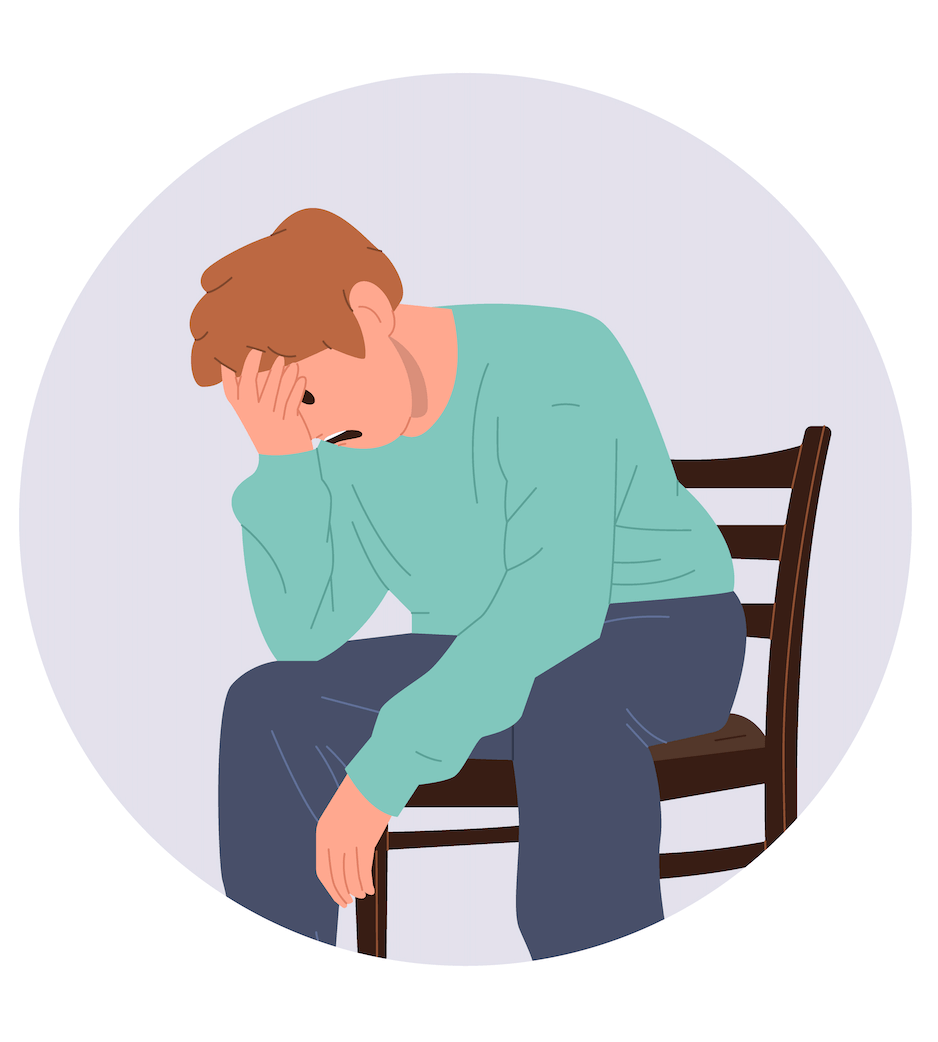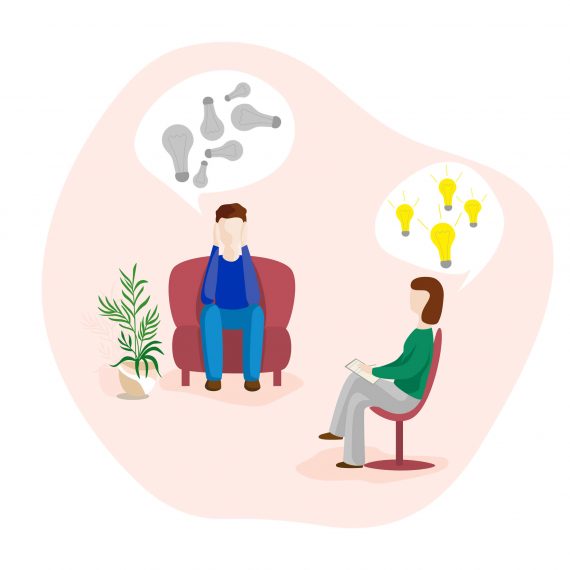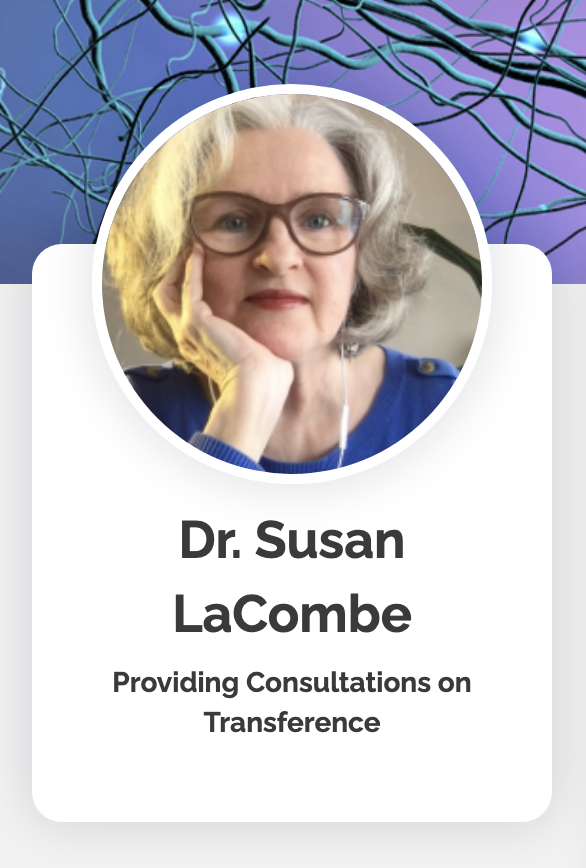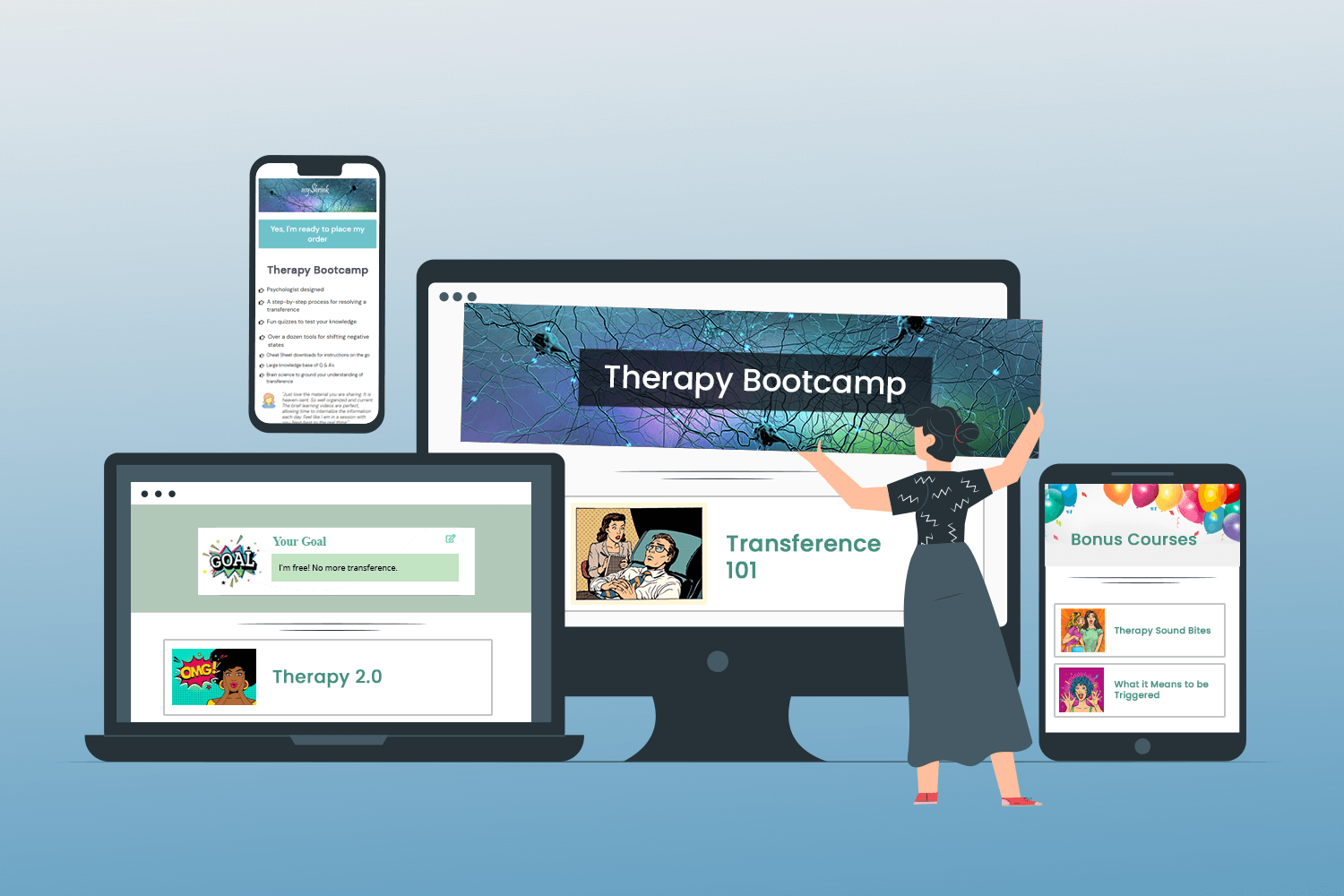Strategies and Tips for
Dealing with a Transference
1. The first tip dealing with transference is to recognize that you're being triggered even though that in itself won't change the underlying dynamics of a transference.
2. Recognize that owing to being triggered, you're experiencing a memory from the past (called an implicit memory). That "memory" is the feeling of an unmet need.
3. Until this unmet need "memory" is processed, it'll continue to absorb your waking moments.
4. To process this "memory" you must time stamp it so instead of having the feeling of it happening right now, it's a feeling you recognize coming from the past.
5. To eradicate the memory charge (and time stamp it), you must have a "catch-up" experience that "completes" the transference need.
Part 3 of a 4-Part Series
Part 1: What is transference? Do I have one?
Part 2: Typical Transference Examples
Part 3: How to Deal with Transference
Part 4: Tips for Dealing with Transference (you're here)
Related: Countertransference in Therapy
Related terms: projective identification, transference neurosis, parataxic distortion.
Tips for coping with
a transference in therapy
You must understand that recognizing transference is only the first step in working with it. No amount of reading about transference is going to change it—including this article 😉
It's also important to acknowledge that some therapists stop at this point. Their assumption is, "If you hear the message enough times, you'll finally get it."
This is a thinly-disguised cognitive (left-brain) approach.

The idea is to get the thinking part of your brain (the left brain) to understand that the attachment you feel towards your therapist is a type of illusion. The expectation is that once you fully embrace this idea, you'll be done with your transference.
I don't think it's intentional but I feel this approach is insulting. Just imagine if the transference has been going on for years (which is not unusual). Are you supposed to conclude that you're just being stubborn? Or worse, that you're somehow flawed?
In contrast, I've had great success when my clients follow a right-brain approach. The reason is simple—transference is a right-brain issue.
In other words, it's an emotion-based issue.
Tip #1 for Dealing with Transference:
Be present to your feelings
In order to get the most out of your therapy and to promote deep personal change, the brain needs to "experience" feelings associated with your transference in the present moment.
Just discussing your feelings in the abstract, disconnected from your emotional reactions in the here and now, won't resolve a transference.
In the example with Jennifer in the previous chapter, she stayed in the feeling all the time she spoke to her therapist. She used her body based sensations as a tool, like a compass. That kept her in the present moment.
Note that Jennifer didn't spend her time and energy trying to figure out why she was having a transference. She blamed neither herself nor her therapist for its emergence.
She understood that transference arises as a normal part of one's development - when there's a need for a "catch up" experience.
So instead, her sessions were less focused on "talk" and more on "feeling her way through".
Tip #2 for Dealing with Transference:
Be open to a healing experience

Secondly, you need a “healing experience" that neutralizes old reactive patterns in the brain.
Emotional unloading isn't enough.
(It's not enough to have a good cry. You need to shift into a positive feeling state. For example, as your tears subside you might spend a moment taking in your therapist's warm, positive feelings. Or maybe your therapist said the perfect thing right at that pivotal moment and you took the time to deeply take it in.)
These types of "healing experiences" normally occur in therapy, through interactions with your therapist. The not-so-good news is that usually these pivotal moments tend to occur randomly.
So if you don't recognize it's importance, a pivotal moment can pass without your awareness. Another missed opportunity 🙁
Where You Can Get Stuck
The main issue here and where a lot of people get stuck is that these healing scenarios need to be tailored to your exact needs.
For many people that are dealing with transference for years, it's my impression (from the descriptions I receive from my visitors) that they don't yet have the emotional capacity to get underneath the transference to identify the exact need.

Secondly, even when they do have the emotional capacity, they're not getting the specific kind of healing experience to complete the transference.
So for example, you may have unravelled during a session with an emotionally available therapist and you're still left feeling you need something more.
Main Strategy for Dealing
with a Transference
With a greater emotional capacity and with the knowledge of what's driving the transference, you can be proactive.
We've learned from brain-wise, body-based clinical practice that you can take some fairly simple steps to use the transference itself to create the kind of experience your brain needs.
Recall that Jennifer's therapist encouraged going deeper with the feelings, which resulted in her discovering some negative emotions. The two worked together to help Jennifer move into a more positive feeling state.
This practice of sustaining moment-to-moment awareness and shifting from a negative feeling state to a positive one actually builds the new neuropathic connections that change you at your core.
Bonus Transference Tip #3
Even aside from knowing any brain science tips, you can be more purposeful in moving through your transference.
You see, your "pivotal moments" can be recalled repeatedly at any time, automatically triggering the good feelings you had back then. (Hey, maybe you're already doing that 🙂
Practicing this "fills you up" on the inside by strengthening new, more efficient neuropathways in the brain.
It fills in the gaps!
Pat yourself on the back if you're in therapy!
Therapy is the most efficient and effective personal change agent I know. Within the safety and confidentiality of the therapeutic relationship, you can experience the powerful emotions of transference and use them to make incredible personal changes (and only two people in the whole world will know anything about it! 🙂 )
Final musings
In terms of how health professionals deal with transference today, not a lot has changed since we first starting working with transference.
However neuroscience has a few things to say about the process from which we can take some lessons. It needn’t be the scary process many people describe.
Transference will not be prolonged or if approached with these insights in mind, In fact, I advise every therapy client to take advantage of their transference.
New! Rate this article (anonymously)
Was this article helpful to you? Let others know.
Thanks in advance for your feedback
Shrinklady

If you've resonated with my writing and want to finally deal with your transference, check out Therapy Bootcamp.
From Dr. LaCombe . . .
Related Topic
What is counter transference?
Reenactments
Get Over Transference FREE eCourse
Is it possible to get rid of anxiety without medication?
External Resources
Transference among people online
** It's not to say that the therapists during this era weren't caring individuals, it's just that the theories at the time promoted value in "analysis". In truth, I imagine the field attracted those folks who were good at analysis - whether they were also "caring" seemed to be less important. It wasn't until decades later that we had the science to back up the idea that the therapist's emotional availability was playing a key role.
Questions about Transference

Jack
Love and hate my therapist
Transference is a hard thing to deal with in therapy. I'm a man and I'm having a bad transference with my T currently. I feel like I Love her and I've told her and faced it all my feelings as honestly as I can, but it still hurts.
My transference goes back and forth between positive (love) and very negative(hate) with her. I also have trouble surrending to it and just working it through because I feel my T. has all the power and I'm the one who is very vulnerable.

Shrinklady
Please know you're not alone Jack. Having conflicting feelings is not unusual in regards to transference.
It’s good that you brought your feelings out in the open. . . . a good beginning. The healing part comes - as you correctly identified - in working through the feelings - both negative and positive that emerge in your session.
On a practical level it requires you to be present to the feelings and at the same time to experience a positive interaction with your therapist. I understand from what you’re saying that this is turning out to be a difficult task given the feelings of vulnerability that are arising and where you feel your therapist has all the power.
Can I suggest that these feelings are not unfamiliar to you Jack? You see, as you may know, what's projected onto our therapist - in the absence of truly knowing our therapist - are unmet needs from our early life.
You can imagine then how it wouldn’t be unusual for you to experience these conflicting feelings if for example in the case when you felt natural love towards your caretaker (ie. your Mom) and when the same caretaker was the source of pain (eg. through her own dissociative trauma).
For the infant who’s totally dependent on the caretaker for most of his needs, it can create enormous conflicted “push pull” feelings. It’s this conflict that I believe is emerging in your transference and that is triggering the feelings of helplessness.
The feeling that your therapist has all the power relates to not having a measure of control over feelings. This is something that you develop when you harness the power of the nervous system. As I have attempted to explain elsewhere - with practice - you can grow this capacity.
Hope this gives you some ideas to work with,
Shrinklady

Hannah (Manitoba, Canada
Feel like a stalker
I have a similar situation to that of Dale's. I am a lesbian as well, but I am married to my partner of 11 years and very much in love with her. I have been very concerned with my feelings that I have had towards my Psychiatrist (also female, but much older).
I have serious issues with talking to people about my personal 'stuff' so seeing a Dr. was a difficult choice to make for me. My first 10 sessions were very very quiet on my part. But yet after my 4th session I realized that I had significant sexual feelings towards her and started to research her on the net, finding out such personal things as her home address (which I have driven by).
I feel like a stalker and my partner is also becoming concerned with how interested I am in the Dr's life! I'm afraid to tell her (Dr.) how I feel because like everyone else, the thought of the rejection is horrifying. By the way, she has diagnosed me with an Anxiety Disorder with Panic Attacks.
I really noticed that I had deep feelings for her when she had suggested that our sessions end until I felt I was able to participate in the Talk Therapy she was offering me. I freaked and started to cry (the first time I showed any emotion in an appointment). I told her that we couldn't end the sessions because I wasn't ready and I didn't think that I could handle not coming, then explained how stressed I was when our appointments were cancelled over Christmas.
She decided to continue the sessions as I had made a breakthrough at that point. I should have said something at that point but didn't understand the feelings myself, let alone have to explain them to her.
I googled 'being in Love with your therapist' and came upon the word 'transference', I've now realized, after reading your site and others, that I am normal (so to speak). I think that because I had a very poor connection with my mother as a child/young adult (before she died) that I am possibly confusing sexual feelings with that of wishing she were my mother because of the compassion she shows, and her ability to make me feel like she cares.
Anyway, thanks for having such a great site, it's motivated me to talk to her about transference, if I can manage to get it out of me.

Shrinklady
Hannah, thanks for sharing your story with us. As you may have read elsewhere, transference is often a good sign that it feels safe enough to let your emotions out. There just might be enough connection in the relationship that the therapist is likely able to acknowledge and to help you work through these feelings. So I'm glad to hear you are on this journey of healing.
If you haven't already brought up the subject (it's been some time since you posted) I'd encourage you to do so – it can be a real door opener for you and a healing moment and more for your therapy.
You mentioned that "I should have said something" in reference to your breakthrough. You know, you can always pick this up at any time during your sessions and make it your right time.
For example, you can take a moment and recall that session with her. Tell her you've given it some thought and you realize now what you didn't realize then, that you've become attracted to her. Even if you've already raised the subject of transference with her, remember that earlier sessions and your interactions with your therapist always make for good therapy material.
Another observation: I felt it was unfair and unfortunate for your therapist to threaten abandonment because you weren't saying enough. When I read your post I was reminded of my own experience many years ago with a psychiatrist. I would sit there, session upon session, saying little. She was kind enough towards me, but now I know that being "nice" isn't the stuff that makes for good therapy.
Good therapists help clients learn to regulate their emotional states and that requires the hard work of being emotionally attuned and engaged in the present moment and throughout the session.
From neuroscience, we've learned that it is essential for our emotional brain to have safety. Yet my therapist then did little to foster the sense of safety I needed, other than to gently ask me questions. We never talked about the need to reduce my fears or find ways to help me feel safe in the sessions.
It's my belief that the therapists who get results teach folks to “ground" themselves through the body and/or to resource themselves by recallling pleasant experiences (i.e. using body psychotherapy techniques such as belly breathing and focusing). They make the task of grounding an explicit, concrete part of the therapeutic work.
The therapist's job is to meet the client where ever he or she is at. If a client isn't able to embrace the therapy approach - particularly when the presenting problem is around self-expression - then the working through might entail what blocks her from sensing into the energy of her words. (For instance in your case, what happens when you think about speaking. What shows up in your body? What are the sensations?)
You see, therapy isn't about getting it right before we arrive at the front door. It shouldn't be a sink or swim experience. Ideally, the therapist is there to help you take your small steps and to show you the way to your best life ever!
If you find these thoughts worthwhile, you might think about opening up a dialogue for further discussion with your therapist – I suspect it just might lead to a new line of therapeutic encounters.
All the best,
Shrinklady

Shaz, London
Transference is not cool and should never be encouraged
I have suffered extreme transferance and don't find it cool at all. It has left me with feelings of rejection and abandonment and I will never get over the intense pain I felt. It has taken me two years to get to some sort of normal and I still get waves of deep sadness. I have spoken to many, many sad hurt people who suffer this and some,including myself, have been suicidal. I believe, until you know enough about the damage that can be done, it should not be encouraged at all. The last thing I would describe as is cool.

Shrinklady
I stand corrected Shaz. What you experienced is definitely not cool. The reality is that much can be gained in therapy without working with transference or encouraging it to develop. Without sounding self-serving, I wrote a whole program that took over three years to develop for just that purpose. You can get beyond it whether you’re still in therapy or not.
I also agree that transference need not be encouraged. I personally don’t ascribe to those therapies that purposely try to induce it (where the therapist says very little or is barely available emotionally to the client etc.). What’s worse is that I’ve heard from folks who’ve been in this situation and they’ve described having been left to their own resources to get through it. Like nothing is explained to them and no tools to speed up the process are provided.
In this latter instance in my view, the therapist’s role tends to perpetuate the same dynamics that the client experienced at the hands of an ill-suited caretaker.
Transference though is a reality in all relationships to some degree albeit it can be quite small in some regards. So whether the therapist encourages it or not, it’s bound to occur in some instances.
What I hope to make known is that neuroscience offers us a hope and the tools to get through much faster and much easier than was previously thought.
I hope that one day you will feel you’re beyond it and that your life is the richer for it.
Best regards,
Shrinklady

Carol. Omaha, USA
Can my CBT therapist help me resolve my transference?
My therapist of 3 1/2 years recently told me I was getting close to being ready to terminate therapy. I originally went to him as part of a compulsive gambling treatment program (I was also abusing prescription drugs at the time) I have truly turned my life around to a miraculous degree--I have not practiced my addictions since about 6 weeks into treatment.
However, my gut reaction to my therapist's pronouncement was to feel extreme fear of abandonment. He has been very like my own father to me throughout my process of reclaiming my life. (My dad died in 1991)
Anyway, my question is this: Must the therapist be psychodynamically oriented for me to resolve my transference? My therapist is very CBT focused and does not express very much emotion. I read something you wrote about a therapist needing to be emotionally responsive enough in the therapeutic relationship for the transference to resolve. Am I out of luck if this man chooses to remain somewhat emotionally unavailable.

Shrinklady
Yes, Carol, that's right. In order to heal we need some of the same conditions that were present when we first developed our emotional template. We need our therapist to be emotinally available to us. In this way we feel some of the same type of feelings that we had as infants. This helps us to reconfigure neuropathways and old emotional patterns.
When your therapist has been with you over a period of time, this helps to heal that part of you that didn't get consistent care. This care, in effect, helps heal old wounds. It seems that this might be the case with your therapist as he's been there with you for 3 1/2 years.
What's also necessary for healing is a therapist that is sufficiently present and attuned. This describes a therapist that appreciates the importance of relationship and being emotionally available. He or she works to be there for you. For instance, he might pull back and/or challenge you as he senses you're readiness for the next step. You feel he really "gets" you.
What troubles me Carol in your description of your therapist are the words, "this man". They appear to reflect a lack of felt connection (and maybe healthy anger at suddenly feeling dropped).
Let me propose a hypothesis. We all choose a therapist based on our history. We either choose the familiar or the scary (albeit not too scary) "expansive-for-us" therapist. In the former, the "familiar" feels comfortable. So, for example, if a lack of connection is all we know, then it feels "just right"--at least initially.
Carol, it is very possible this is how you initially came to your therapist. You chose what you knew. However with your growth over the years, you are now recognizing a need for more connection. Sometimes we don't know how we've grown until it is brought to our attention. And, your recent experience with your therapist may have been one of those times. That is, how you feel about connection with another may have become more apparent to you when he suggested terminating your therapeutic relationship.
However, crappy this proclamation by your therapist feels, it is all well and good as an indicator of your emotional growth.
It is true that some treatment approaches are not sensitive to relational dynamics. This doesn't necessarily mean that the therapist isn't. If you are up for the task of bringing your feelings into the therapy, he may respond in kind.
Let me give you an idea of the kind of optimal reflections a therapist that's concerned about the therapeutic relationship might make. So, he might say for instance, "You know, I think you're doing really well. And I have noticed all these changes during our work together (such as x, y and z) and I'm so excited about how far you've come. Given this, I have an inkling that we may be heading into a home stretch. What do you think and how do you even feel that I am bringing this up to you today?"
These of course are just a sample of ideas but hopefully they give you an idea of what's possible. It strikes me that a therapist that is able to work with a client for 3 1/2 years might have the kind of qualities that makes it easy for clients to continue i.e. he has some of the emotionally available traits I'm referring to. (Clients tend to leave therapists sooner who aren't good at relationship building.)
I think he might also be able to apply his treatment model to your issue and help you work this out. But it'd be good to tell him how you felt when he mentioned termination (hate that word...sounds like there's no hope and the image of Arnold Schwartzanager doesn't help) and ask him if he felt he could help you work it out. Based on his response, you can decide if he is up to the task.
Carol, it's not unusual that one therapist is good for only a part of our journey. In fact, my therapist today would not have been a good fit for me years ago. So in your case, if you feel he is not making the kind of effort to connect with you especially over this issue, you may need to seek out someone who can take you to the next level.
I wish you well on your journey,
Shrinklady and Dr. Carole (we all need helpers )

Audrey
Constantly worried about being close to anyone
I have issues with people walking out of my life. I am constantly worried about being close to anyone. However, I notice that i have a serious attraction to my therapist. I feel like I need to stop going to her because I feel like she will realize this and stop seeing me. I find it hard to open up to her like i sholud because of my feelings for her.
What is your advice to this problem. ps I am thinking of telling her how i am feeling. Is this a good idea?

Shrinklady
Hi Audrey, should you tell her? Yes, that's what therapy is all about.
It's been some time since I'm responding to your question Audrey so you may have already taken this step. And I believe you already answered this question for yourself in your post. You mentioned that you have a hard time being close to someone. Yet, here you are...deep into the beginnings of a new level of closeness with another human being and your fear of abandonment is coming up. Good.
We need the feelings to be present in order to change them. This is what therapy offers, a new experience from which the brain can learn from.
Try to remember that your fears arise from experience - experiences you likely had as an infant. What we've learned through neuroscience is that what develops in relationship, must be healed in relationship.
So, it is natural that you would be fearful of becoming close and then abandoned. Good therapy offers a chance for us to tease these crossed wires apart so that one day, feeling emotionally close is synonymous with trust and safety.
All the best on your journey Audrey,
Shrinklady
If you've read enough to be intrigued about my approach, click here to get through your transference.




